

Developing a System for the Accreditation of Digital Learning in Malta. Are ‘challenger institutions’ really gamechangers for the future of higher education? Higher education (HE) is undergoing fundamental reform.
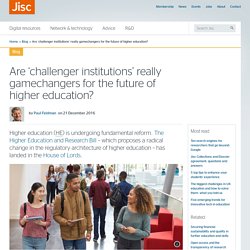
The Higher Education and Research Bill – which proposes a radical change in the regulatory architecture of higher education – has landed in the House of Lords. The bill proposes measures to relax the entry of new learning providers into the market. Against the backdrop of such changes, now is the time to closely examine whether ‘challenger institutions’ are really providing students with an alternative choice. A changing HE landscape The higher education landscape has historically been diverse and the sector has always engaged in debates around this. In our current context, there are examples of higher education providers who are working dynamically to offer students a different choice to the ‘standard offer’ of the three-year, campus-based, undergraduate degree.
'Pop up' courses redefining electives model. Dive Brief: Bennington College has launched a series of short-term, real-time elective courses based upon niche subjects or current events playing out, such as the 2016 presidential election.

Inside Higher Ed reports on the construct of the courses, which are designed by professors, last for a number of weeks shorter than a traditional academic term, and examine areas like health care, politics and social justice with research and exposition. Why the Blockchain will Revolutionize Academic Credentialing – Learning Machine Blog – Medium. This is a transcript of the presentation given during Educause at the Anaheim Convention Center on October 28, 2016.
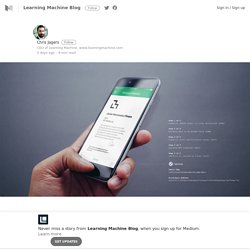
Hello everyone. My name is Chris Jagers. More proof that 'meritocracy' (as we currently understand it) doesn't work. 2 min read Earlier this month I wrote a post entitled Why It's Time to Let Go of 'Meritocracy'.

I argued that: A simplistic meritocratic approach to society and our education systems has failed. 3 things we need for the next big frontier in Open Badges and digital credentials. Just less than a year ago, I wrote a post entitled Why the future remains bright for Open Badges.
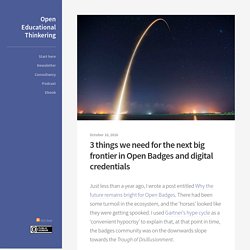
There had been some turmoil in the ecosystem, and the ‘horses’ looked like they were getting spooked. I used Gartner’s hype cycle as a ‘convenient hypocrisy’ to explain that, at that point in time, the badges community was on the downwards slope towards the Trough of Disillusionment. Right now, I think we’re coming out of that trough. We’re beginning to see people and organisations looking beyond individual badges towards connected credentials. Elon's new digital transcript offers broad view of student performance. Dive Brief: Elon University has launched a new "visual experiential transcript" to provide students and potential employers with a unique view of their undergraduate accomplishments and activities.
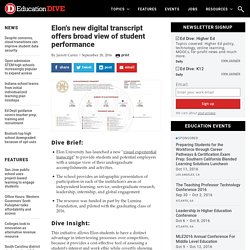
Economist suggests Ed Dept credentialing as college cost cure. Dive Brief: Economist Carlo Salerno writes in the Huffington Post that allowing the U.S.
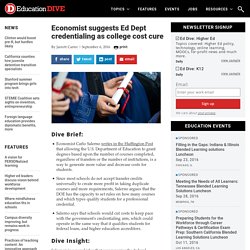
Department of Education to grant degrees based upon the number of courses completed, regardless of transfers or the number of institutions, is a way to generate more value and decrease costs for students. Since most schools do not accept transfer credits universally to create more profit in taking duplicate courses and more requirements, Salerno argues that the DOE has the capacity to set rules on how many courses and which types qualify students for a professional credential.
Five Best Practices for Implementing an Alternative Credentialing Program. By Jim Fong, Peter Janzow and Kyle Peck Today’s employers and job seekers are constantly looking for ways to gain an edge on their competitors.
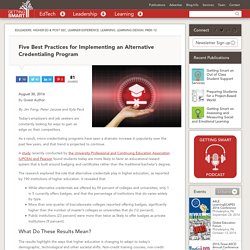
As a result, micro-credentialing programs have seen a dramatic increase in popularity over the past few years, and that trend is projected to continue. Institutional badging emerges as new resume booster. Dive Brief: Illinois State University's badging program allows students to more creatively showcase volunteerism, technical training and skill development to potential employers and graduate schools.
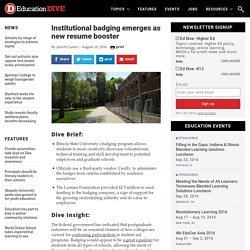
Officials use a third-party vendor, Credly, to administer the badges from criteria established by academic executives. The Lumina Foundation provided $2.5 million in seed funding to the badging company, a sign of support for the growing credentialing industry and its value to employers. Dive Insight: The federal government has indicated that postgraduate outcomes will be an essential element of how colleges are viewed for continuing participation in student aid programs. Recommended Reading Inside Higher Ed: Digital, verified and less open. Alternative Credentialing in Higher Ed: Key Findings. Class Central's MOOC Report.
This is a guest post from Mathieu Nebra.

Mathieu is co-founder of the largest vocational EdTech platform in Europe, OpenClassrooms. No matter how far I look back, I’ve always seen diplomas and degrees as the bridge between education and work. It’s what I’ve been taught: you learn when you’re young, then you get a degree, and then you apply it at work for the rest of your life. It’s as if learning could only happen when we’re young; it’s as if working isn’t about learning, too. And it’s sad. But things are changing fast these days. Millennials prefer credentialing programs to traditional degrees. Dive Brief: A new study reveals that more than 90% of American colleges and universities offer alternative credential or badging programs for certification in industry-specific careers.
The University Professional and Continuing Education Association says millennial survey respondents prefer certifications to bachelor’s degrees, and schools are responding with increased development of professional training silos. Millennials prefer credentialing programs to traditional degrees. 3 Ways Open Badges Work Like the Web. “The web is more a social creation than a technical one. MOOQ. Are stackable credentials now a necessity? Dive Brief: Holly Moore, executive dean of South Seattle College’s Georgetown Campus, believes stackable credentials are a necessity in higher education, both for the success of students who need flexibility and because they can help institutions maintain connections with alumni and improve outcomes.
In a Q&A with The Evolllution, Moore says institutional leaders must develop stackable programs based on conversations with employers and create a feedback loop so improvements can be made based on actual outcomes. Beyond ensuring programs meet federal financial aid requirements, Moore recommends working closely with student services and financial aid departments to secure institutional buy-in for stackable programs and necessary financial support for students who choose them. Dive Insight: Traditional colleges as well as alternative providers are rushing to offer short-term certificate programs to give working adults an opportunity for quick retraining. Recommended Reading. Verifiable Credentials on the Blockchain — Learning Machine Blog. Verifiable Credentials on the Blockchain The world needs a new system to record, house, curate, secure, and distribute evidence of learning.
That new storage system is the global blockchain and every individual is a lifelong registrar. The MIT Media Lab and Learning Machine have been working on a collaborative project for issuing official credentials, also known as certificates, onto the Bitcoin blockchain. We’ve just open-sourced the first version of that project. It allows education providers, employers, and others to issue official certificates that supply proof of membership, completion, or achievement. Our goal is to help create an entirely new environment where individuals are the custodians of their official records and can easily share those records with others. FutureLearn Steps into the World of MOOC-Based Credentials With "FutureLearn Programs" Er.educause. The shift in postsecondary credentialing and the needs of the 21st-century workforce will revolutionize higher education.
Colleges and universities have vast potential to be positive agents of this change. While the modern technology revolution has reshaped nearly every sector of society, higher education has managed to retain its fundamental structure from centuries ago. New model for measuring MOOCs completion rates. UMassOnline joins the ranks of alternative credentialers. Dive Brief: The University of Massachusetts’ online arm, UMassOnline, has announced a non-credit badge program in project risk management, bringing the university in line with an alternative credentialing trend sweeping the higher ed marketplace. According to eCampus News, the self-paced program is made up of three modules that teach risk management planning, risk identification, qualitative and quantitative risk analysis, risk response planning, and risk control.
Stackable degrees gaining prominence as entry points to grad school. Lfna27660enn. Right Signals initiative aims to make sense of credentialing. Dive Brief: The American Association of Community Colleges, with funding from the Lumina Foundation, will create a new model to help students, employers and colleges make sense of the variety of credentials across higher education. In announcing the initiative, the AACC said it would focus on degrees, certificates, industry certifications, apprenticeships and badges in a model that will allow people to identify courses, skills and continuing education credits that students have with each credential. Community colleges in Illinois, Ohio, Maryland, Kentucky, Wisconsin, Iowa, New York, Texas, Wisconsin, Missouri, Florida, Arizona, Alabama, Washington and Minnesota are among those participating in the Right Signals initiative.